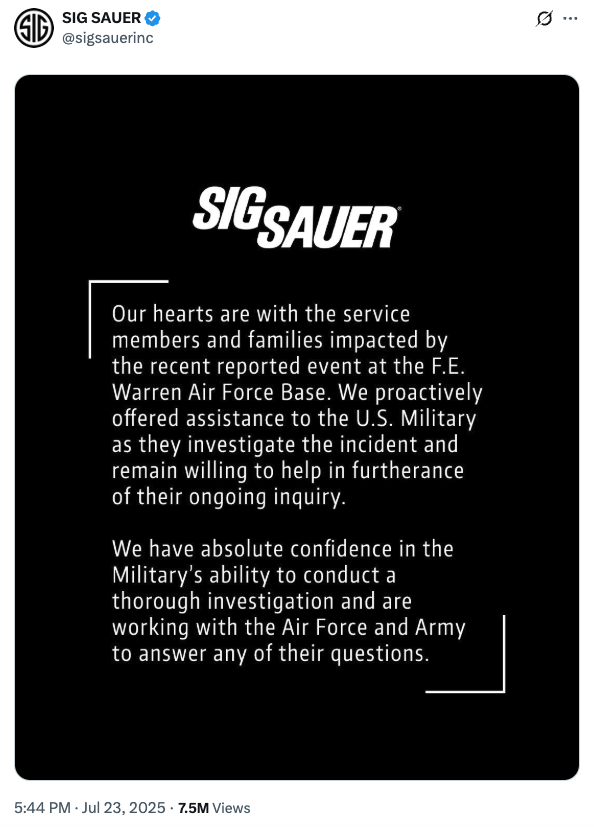Editor’s Note: Months after this story was published, the U.S. Air Force released a statement noting that the M18 in question did not fire unintentionally. Instead, an airman allegedly pointed his gun at the victim in a “joking manner” before killing him and asking witnesses to lie about the incident. The suspected shooter was later found dead after being arrested on suspicion of involuntary manslaughter and making a false statement.
The U.S. Air Force Global Strike Command announced this week that it had temporarily suspended the use of the standard-issue Sig Sauer M18 pistol “[o]ut of an abundance of caution and to ensure the safety and security of our personnel” after the death of an active-duty airman on July 20. The Air Force, which is currently investigating the incident that occurred at F.E. Warren Air Force Base in Wyoming, has not released further details.
The M18 is a compact version of the Sig Sauer P320 adopted by the U.S. military, alongside the full-size M17 variant, in 2017. In recent years, dozens of lawsuits have been filed against Sig Sauer by civilians and police officers who allege that their P320 pistols fired without intentional trigger pulls. Multiple law enforcement agencies have also removed the pistols from duty over safety concerns, including the Dallas, Chicago, and Denver Police Departments, as well as police academies in Washington and Oregon.
On July 9, Immigration and Customs Enforcement (ICE) Deputy Director Madison Sheahan issued a letter stating that agency personnel could no longer carry P320 pistols. That same day, Outdoor Life published a previously unreleased FBI report concluding that “movements representing those common to a law enforcement officer” could disengage a safety mechanism inside the P320. The FBI’s Ballistic Research Facility produced the report in August 2024, after testing a P320 that had allegedly fired from within a Michigan State Police officer’s holster.
Despite those findings, the Michigan State Police recently adopted the P320/M18, as Sig Sauer announced on its website.
sig sauer’s responses
After news of the airman’s death became public, Sig Sauer tweeted, “Our hearts are with the service members and families impacted by the recent reported event at the F.E. Warren Air Force Base. We proactively offered assistance to the U.S. Military as they investigate the incident and remain willing to help in furtherance of their ongoing inquiry.”

The statement, which did not mention the P320 or M18, stands in stark contrast to the company’s earlier defenses of its pistols. Last summer, Sig Sauer CEO Ron Cohen called critics “vultures that enjoy picking at a company, especially the companies that are on top.”
When confronted with video footage of a police officer’s P320 firing while holstered, Sig Sauer claimed that the pistol had not been properly holstered, leaving the trigger “exposed and vulnerable to actuation.”
More recently, on March 7 — days after the Washington Criminal Justice Training Commission banned the P320 from its properties and training courses — Sig Sauer issued a combative statement claiming that the P320 “CANNOT, under any circumstances, discharge without a trigger pull.” Instead, the company said the “anti-gun mob” and “individuals seeking to profit or avoid personal responsibility” were attacking the pistol design.
JEOPARDIZING military personnel
The airman’s death marks the first known fatality involving a military-issued M18, but documents obtained by New Hampshire Public Radio (NHPR) detail nine separate unintentional shootings involving P320s and Army, Navy, and Marine Corps personnel between September 2020 and June 2023. Some sustained serious injuries, including one soldier who said he didn’t “feel safe around those weapons anymore.”
The military flagged early safety concerns while testing P320 pistols for the Modular Handgun System (MHS) trials. In a fiscal year 2017 report, the Army noted that the M17 and M18 were capable of discharging when dropped, and Sig Sauer “modified the trigger mechanism to eliminate this deficiency.”
The company also offered a “voluntary upgrade” to civilian P320 owners in August 2018 after a video surfaced showing the pistols firing when dropped at a certain angle. However, many of the lawsuits filed against Sig Sauer allege that even “upgraded” P320s can fire without intentional trigger pulls.
The decisions by the Air Force Global Strike Command and ICE could have broader implications for other branches of the military and the Department of Homeland Security, respectively, and may lead to increased scrutiny for Sig Sauer’s other contracts.
Gun industry reactions
Following the Air Force incident, Gunsite Academy, one of the country’s oldest civilian firearm training academies, announced that it will no longer allow students to use P320 pistols in its courses. In a statement, Gunsite CEO Ken Campbell said, “Currently, there are significant questions being asked in our community about the operation of the [P320]. After much consideration, we have decided that until these questions have been answered to our satisfaction, Gunsite will no longer allow [it] to be used in classes, effective immediately.”
In a blog post, Dan Zimmerman of Shooting News Weekly surmised that “[g]iven the increase in these reports, it’s only reasonable to conclude that the ongoing controversy surrounding the P320 is becoming an increasing problem for Sig Sauer in terms of legal costs, likely reduced sales of P320 platform pistols, and the inevitable reputational hit that will result from such reported incidents.
In May, New Hampshire lawmakers enacted a law designed to shield Sig Sauer from product liability claims, including those targeting firearms that lack certain safety mechanisms.
Despite the controversy surrounding Sig Sauer’s P320 pistols, the National Shooting Sports Foundation, the gun industry’s trade association, has been silent on the topic.